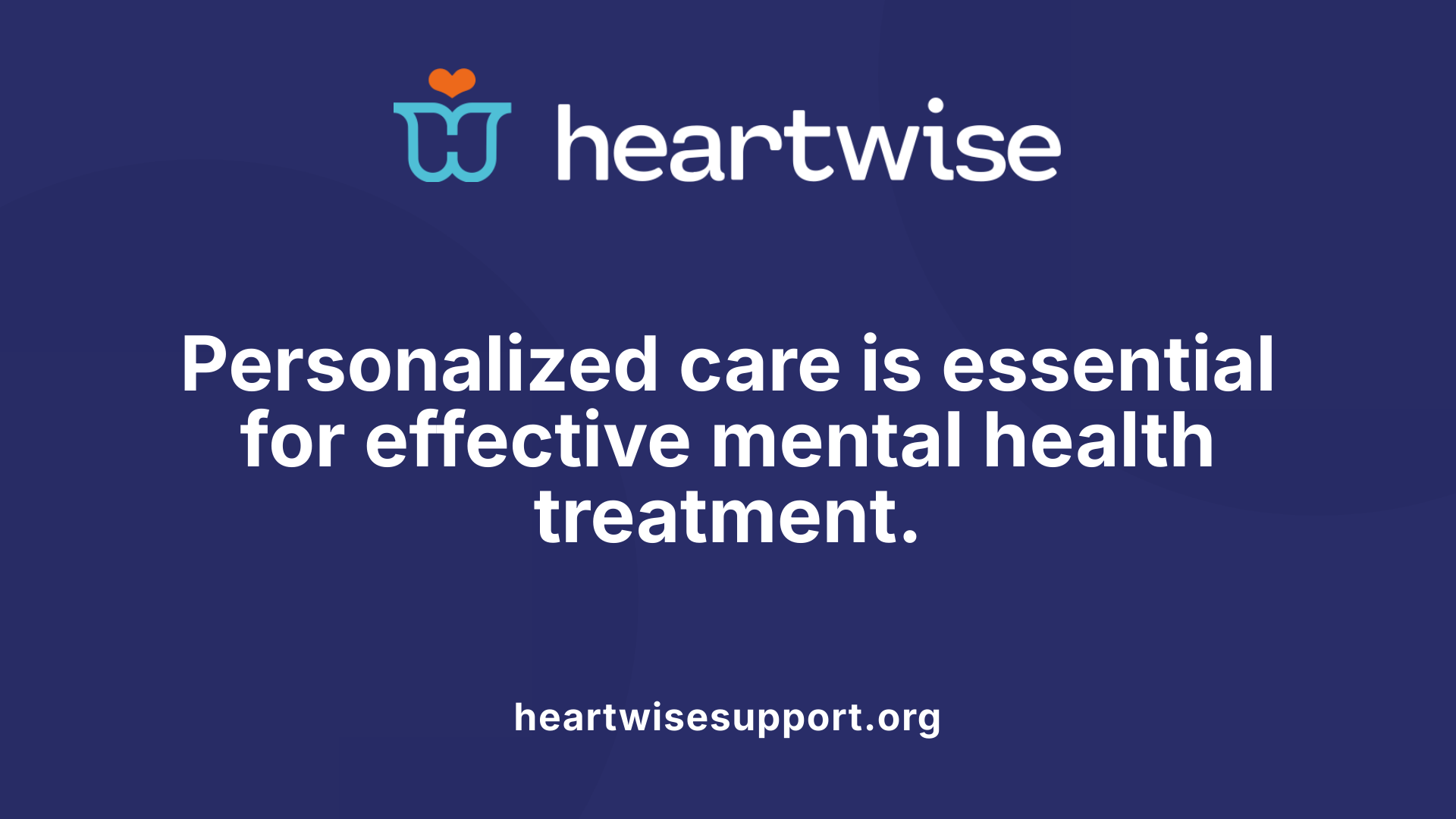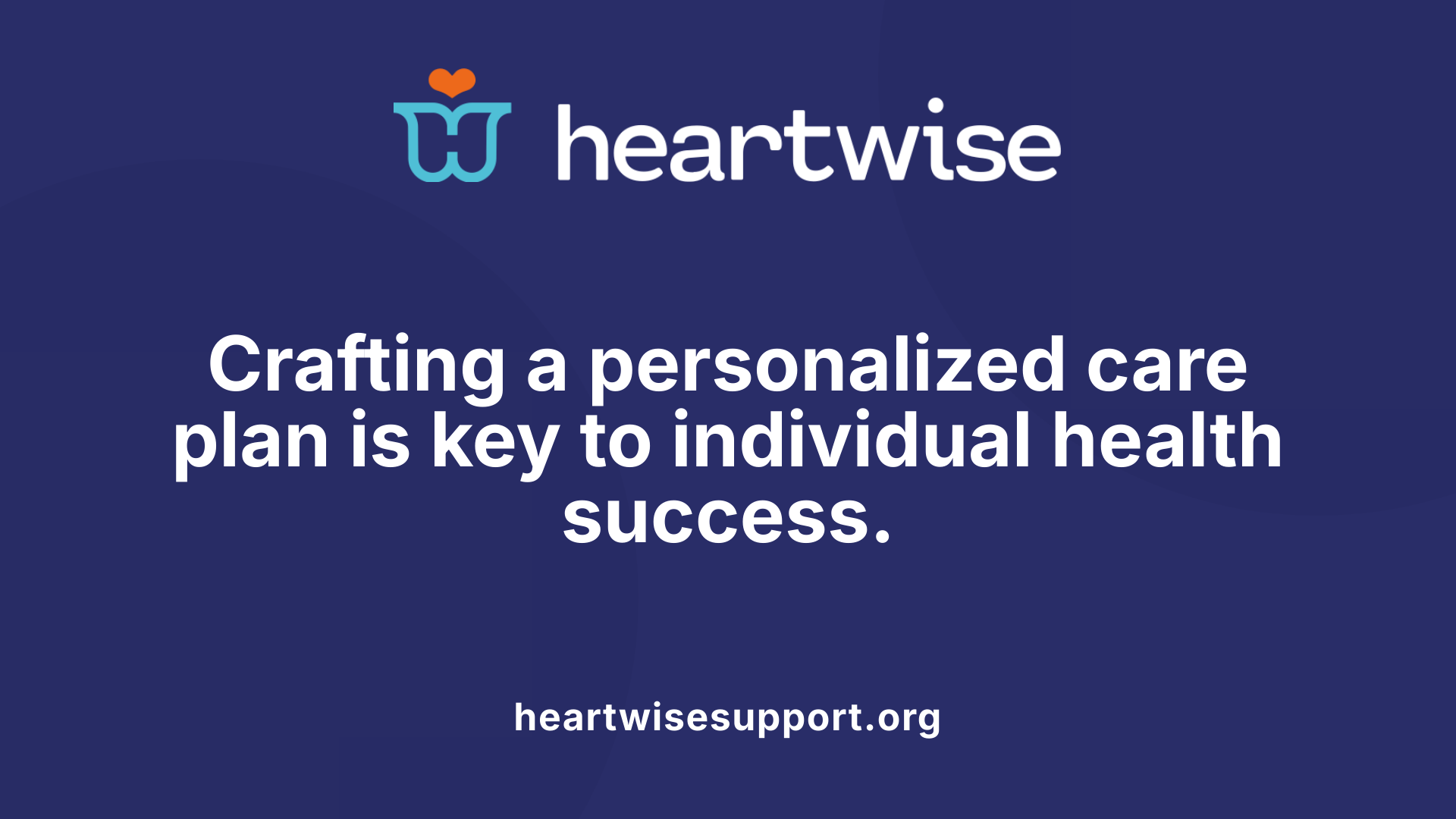Introduction
In the quest for optimal mental health management, the importance of personalized support cannot be overstated. The journey to mental well-being is unique to each individual, influenced by personal needs, preferences, and circumstances. This guide will explore how to create a personalized mental health support plan, emphasizing the necessity for customized care, strategies for implementation, and methods for tracking progress.
Understanding the Necessity of Personalization in Mental Health Care

Why is Personalized Care Important?
Personalized mental health care is crucial because it tailors treatment to individual needs and circumstances. Not all patients respond the same way to standardized treatments; thus, a one-size-fits-all approach often falls short. Creating personalized care plans allows for individual differences in diagnosis, symptoms, and personal experiences to be taken into account. This is particularly important in mental health, where emotional, social, and environmental factors play significant roles.
Benefits of Personalized Mental Health Support
The benefits of personalized mental health support are manifold:
- Improved Engagement: Patients are more likely to participate actively in their treatment when they feel that it is tailored to their unique needs.
- Enhanced Satisfaction: Customizing treatment leads to higher satisfaction rates among clients as their specific concerns are acknowledged and addressed.
- Better Outcomes: Personalized approaches often result in quicker symptom relief and a reduced risk of relapse, as treatments target the root causes of issues.
- Empowerment: Involving patients in the decision-making process enhances their motivation and optimism regarding their treatment plan.
In essence, personalized care not only improves patient outcomes but also fosters a sense of ownership over one's mental health journey.
The Foundations of a Self-Care Plan

Components of a self-care plan
Creating a personalized self-care plan involves several key components that encompass various aspects of your life. The primary domains to consider include:
- Physical Health: Activities such as regular exercise, a balanced diet, and adequate sleep.
- Emotional Well-being: Practices like journaling, therapy, or engaging in hobbies that foster emotional expression.
- Mental Health: Pursuing intellectual interests, practicing mindfulness, or participating in creative activities.
- Social Connections: Building relationships by spending quality time with friends or family and nurturing community ties.
- Spiritual Needs: Engaging in activities that bring spiritual fulfillment, such as meditation or spending time in nature.
Importance of self-care
Self-care is vital for maintaining overall health and well-being. It plays a crucial role in preventing burnout, reducing stress, and improving mood and self-awareness. A well-structured self-care plan enables individuals to support not only their own health but also enhances their capacity to support others.
Identifying your specific needs through self-reflection is essential to personalize your self-care practices. By setting realistic, achievable goals aligned with your individual values, you create a sustainable framework for well-being. Additionally, involving trusted friends or family members can provide support and accountability, reinforcing the holistic nature of your self-care journey.
Components of a Personalized Care Plan

What should I include in a personalized care plan?
A personalized care plan should encompass various essential details to create a comprehensive approach to an individual's health and well-being. This includes:
- Personal Details: Basic information and medical history relevant to the individual's treatment.
- Health and Wellbeing Goals: Specific objectives the individual aims to achieve, ensuring they align with their unique circumstances.
- Medication Details: A list of current medications, dosages, and any related side effects or interactions.
- Self-Care Support: Identification of activities that enhance well-being, such as exercise routines, diet preferences, and relaxation techniques.
- Social Support Systems: People the individual can rely on during tough times, enhancing their emotional resilience.
- Environmental Risks: Factors in the individual’s surroundings that may affect their mental health, such as stressors or unsafe conditions.
- Nutritional Requirements: Specific dietary needs or preferences that support the individual’s health objectives.
- Communication Preferences: How the individual prefers to communicate, whether through digital platforms, face-to-face meetings, or written methods.
Adaptations and feedback mechanisms
It is crucial for a personalized care plan to be adaptable and regularly reviewed. Key aspects include:
- Regular Feedback: Gathering feedback from the individual about their experiences and any challenges encountered with the care plan. This ensures it remains effective and relevant.
- Ongoing Assessments: Periodic evaluations help adjust the plan based on changing needs or circumstances, fostering a dynamic treatment approach.
- Digital Care Planning Tools: Utilizing technology such as apps or platforms can streamline this process and improve tracking and monitoring of progress.
- Collaborative Review: Involving healthcare providers and family members in the ongoing review process enhances support and accountability.
By integrating these components, personalized care plans not only aim to meet the specific needs of individuals but also promote a positive relationship with their caregivers, leading to better mental health outcomes.
Steps to Creating a Mental Wellness Plan
How do I create a mental wellness plan?
Creating a mental wellness plan is an empowering step towards ensuring your mental health and emotional wellbeing. Here are structured steps to guide you:
Identify Your Triggers and Stressors
- Begin by reflecting on the situations or people that elevate your stress levels. Recognizing these factors is essential for effective management.
- Consider letting go of unhealthy relationships that drain your energy or exacerbate your anxieties.
Build Supportive Environments
- Surround yourself with supportive individuals who uplift and encourage you, as social connections are instrumental in maintaining mental wellness.
- Create environments—both physical spaces and social circles—that promote positivity and reduce negativity.
Cultivate Gratitude and Acknowledge Positives
- Regularly take time to focus on the positive aspects of your life. Practicing gratitude can significantly counteract stress and bolster your mental resilience.
Establish Personal Coping Strategies
- Develop coping strategies that work for you, such as engaging in mindfulness practices, journaling, or exercising. These tools can help mitigate stress in challenging moments.
- Integrate positive self-talk into your routine, aiming to reframe any negative narratives you accumulate.
Monitor and Adjust the Plan
- A mental wellness plan is not static; it should evolve as your life circumstances change. Regularly evaluate which strategies are effective and adjust those that are not working in your favor.
By following these steps, you can create a tailored mental wellness plan that not only addresses your current needs but also cultivates a resilient mindset.
The Role of a Circle of Care in Mental Health Support
Importance of Supportive Networks
A Circle of Care involves a network of individuals who play a crucial role in providing emotional, informational, and practical support during difficult times. This network typically includes family, friends, mental health professionals, and support groups. These connections not only enhance a person’s coping mechanisms but also foster a sense of belonging, which is vital for mental health.
Role of Professionals and Families
Mental health professionals are integral to a Circle of Care, offering expertise in therapy and guidance tailored to a person's specific needs. Family members contribute emotional support and can assist in monitoring changes in behavior or mood. Their involvement ensures continuity in care and helps in crafting a personalized approach to mental health challenges.
It's essential that these networks work collaboratively, with open communication at the forefront. Involving family and friends in treatment discussions can lead to better outcomes, as they provide insights and encouragement that empower individuals to take ownership of their mental health journey.
Combining professional support with the comforting presence of loved ones creates a robust framework for managing mental health effectively.
Integrating Personalized Strategies into Daily Routines
Creating a personalized daily routine
A personalized daily routine can significantly enhance mental health and overall well-being. To effectively build this routine, start by assessing your current situation. Reflect on your daily activities and identify those that provide you with satisfaction, energy, and motivation. It’s vital to incorporate meaningful activities that resonate with your values and goals.
Consider exploring various self-care domains:
- Physical: Ensure regular periods for exercise, balanced nutrition, and sufficient sleep.
- Emotional: Schedule time for hobbies or activities that help you express feelings, like journaling or socializing.
- Mental: Engage in activities that stimulate your intellect, such as reading or problem-solving games.
By setting achievable goals using the SMART criteria (Specific, Measurable, Achievable, Relevant, Time-bound), you can create a blueprint for your daily routine that is both effective and fulfilling.
Balancing structure and flexibility
While having a structured routine is beneficial, it’s equally important to allow for flexibility. This balance promotes spontaneity and adaptability, making your routine more enjoyable and less rigid.
Here are a few strategies to maintain this harmony:
- Schedule downtime: Ensure you have periods of relaxation to unwind.
- Adapt to changes: Regularly revisit your routine to incorporate new interests or commitments.
- Set priorities: Focus on activities that are most meaningful to you, allowing for adjustments based on your energy level and circumstances.
By integrating these personalized strategies, you can build a robust daily routine that supports your mental and emotional well-being.
Collaborative Approaches and Shared Decision-Making in Mental Health Care
Patient-provider collaboration
Collaboration between patients and providers is critical in mental health care. This partnership empowers patients, as they become actively involved in their treatment journey, fostering motivation and enhancing optimism. By working together, patients and healthcare professionals create personalized treatment plans that consider individual preferences, symptoms, and circumstances. This shared decision-making process not only improves the therapeutic relationship but also promotes a sense of ownership over one's mental health.
Enhancing treatment efficacy
Effective treatment outcomes benefit significantly from cohesive patient-provider collaboration. Engaging patients in their care allows for goal setting that reflects their unique needs. These personalized strategies often lead to better adherence to treatment protocols and improved coping skills. Current research highlights that successful treatment plans typically include measurable objectives while being flexible enough to adapt to any changes in the patient's situation. Regular consultations and evaluations ensure that both the patient and the provider stay aligned with the treatment goals, which is essential for achieving long-term improvements in mental health and well-being.
Monitoring and Adjusting Your Mental Health Plan for Continued Success

Tracking Progress
Keeping a close eye on your mental health plan is essential for ensuring its effectiveness over time. Regular tracking allows you to assess not only how well you are adhering to your self-care strategies and treatment goals, but also where adjustments may be needed.
Consider maintaining a journal where you can record your feelings, experiences, and any changes in your mental health status. This reflective practice can highlight patterns and triggers, helping you stay informed about your progress.
Additionally, using apps or tools designed for mental health tracking can aid in monitoring your mood, anxiety levels, or other relevant metrics, making it easier to visualize your improvement over time.
Adjusting to Life Changes
Life can be unpredictable, and your mental health plan must accommodate those changes. Whether it’s a new job, a relationship shift, or personal growth, your needs may evolve, requiring adjustments to your self-care routines and treatment goals.
Regularly revisiting your plan is beneficial. Ask yourself:
- Are my current strategies meeting my needs?
- Do I have new priorities or obligations?
- What new support systems can I integrate?
This reflective approach ensures your mental health plan remains relevant and effective in fostering well-being, empowering you to thrive amid life's changes.
Conclusion
Creating a personalized mental health support plan is an empowering journey that allows individuals to take control of their mental wellness. By understanding personal needs, integrating supportive networks, and employing collaborative strategies, individuals can achieve more tailored and effective care. Through ongoing monitoring and adjustments, personalized plans not only ensure ongoing mental health support but also adapt to changes in life circumstances, promoting resilience and well-being for the long term.
References
- Developing Your Self-Care Plan - UB School of Social Work
- Create a Plan to Take Care of Your Mental Health | JED
- Creating Personalized Care Plans For Mental Health - HIAAH
- Mental Health Treatment Plan Template, Goals & Objectives
- Creating A Personalized Routine For Mental Health
- Personalized care planning and shared decision making in ...
- What Should Personalised Mental Health Support Involve? Views of ...
- The Benefits of a Personalized Mental Health Treatment
- Creating a Mental Health Care Plan - ALL IN Therapy Clinic











